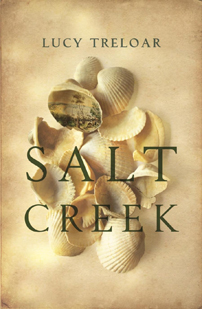 Lucy Treloar’s debut novel is something of a grower. What starts out seemingly as another Australian novel dealing with European settlement in the mid 1800s and the impact it has on the indigenous population becomes something more – much more.
Lucy Treloar’s debut novel is something of a grower. What starts out seemingly as another Australian novel dealing with European settlement in the mid 1800s and the impact it has on the indigenous population becomes something more – much more.
As seen through the eyes of Hester Finch, a privileged 15 year-old at the onset of Salt Creek, we experience the fall from grace of the Finch family due to her father’s overbearing pride and poor business acumen. After another failed enterprise, rather than accept the support of his wife’s parents, he forces the family to leave their comfortable Adelaide existence and head to the beautiful yet harsh coastal landscape of the remote Coroong, a few days ride to the south.
Just opened up to graziers willing to try their luck, the inhospitable region offers opportunities. But driven by Finch’s inexperienced attempts to tame the land and spread Christian values, so he brings hardship, disease and death not only to his own family, but also the displaced Ngarrindjeri.
Leaving Adelaide society behind is not easy for Hester, her younger sister Addie (Adelaide) or the girls’ mother, “the journey to that place was like moving knowingly, dutifully, towards death.” And the rough hewn home among the sand dunes where “there was no porch at the front, only dirt and crushed grass about the house, growing longer against the walls where feet had not trod” has left them devastated, bringing home to them “just how far we had fallen.”
The Finch sons (Stanton and Hugh in particular) see adventure and triumph in ownership of the land. They care nothing for history and the indigenous community who they believe has no rights of access to the water holes, coastal fishing spots or land upon which they seasonally camp. They care nothing for their father’s colonialist Quakerism in wanting to civilise the “local savages”: the introduction of Tull from the Ngarrindjeri into the household as a “project” instils nothing but suspicion.
Over time and watching her ailing mother, Hester places the blame of the family demise firmly with her father. Not that her opinion counts for much – even though her parents support education for both their sons and daughters, Hester’s duty is determined by her gender.
But in the first instance, she knows the need to support their father. Success in the venture would mean a quicker return to the city and conversation. But, unlike most works of fiction exploring settlement, rather than successes in the face of adversity, Salt Creek offers struggling adaptation and failure instead.
Death and discord within the family changes the dynamics. Outside of polite society, perception of duty shifts. Penury brings with it altered expectations and hopes. And then there’s the evolving relationship between Addie and Tull.
The family’s isolation results in the introduction of few other characters – the recently widowed Mrs Robinson, owner of the Traveller’s Inn a half day’s ride away (Irish and a history of working in service means the Finch womenfolk only call upon her once): Mr Bagshot and his son, Charles, travelling through in the mapping of the area: the occasional constable. Few of the Ngarrindjeri themselves cross paths with the family.
It is the relationship between these few characters that is at the heart of Lucy Treloar’s superb novel. As much a story of family, duty, love and tragedy as commentary on European settlement, Salt Creek questions perceptions and assumptions of the time.
The destruction of indigenous culture by the family percolates throughout yet Salt Creek is as much about European Christian hypocrisy and the position of women in 19th century with its limited choices determined by men. Hester is driven to leave her durance behind at all costs: Addie eventually succumbs to social expectation. Masculinity itself is also touched upon – from the strutting Stanton through to the much gentler third brother, Fred: from the romantic Charles Bagshot to the bible-reading father: from the so-called uncivilised Tull to the inn owner, Mr Martin.
Intertwining the characters and events that befall them with real historical events, Lucy Treloar has produced something of a classic novel of early Australian European history. Shortlisted for the 2016 Miles Franklin Award, it lost out to A.S.Patric and Black Rock, White City.
